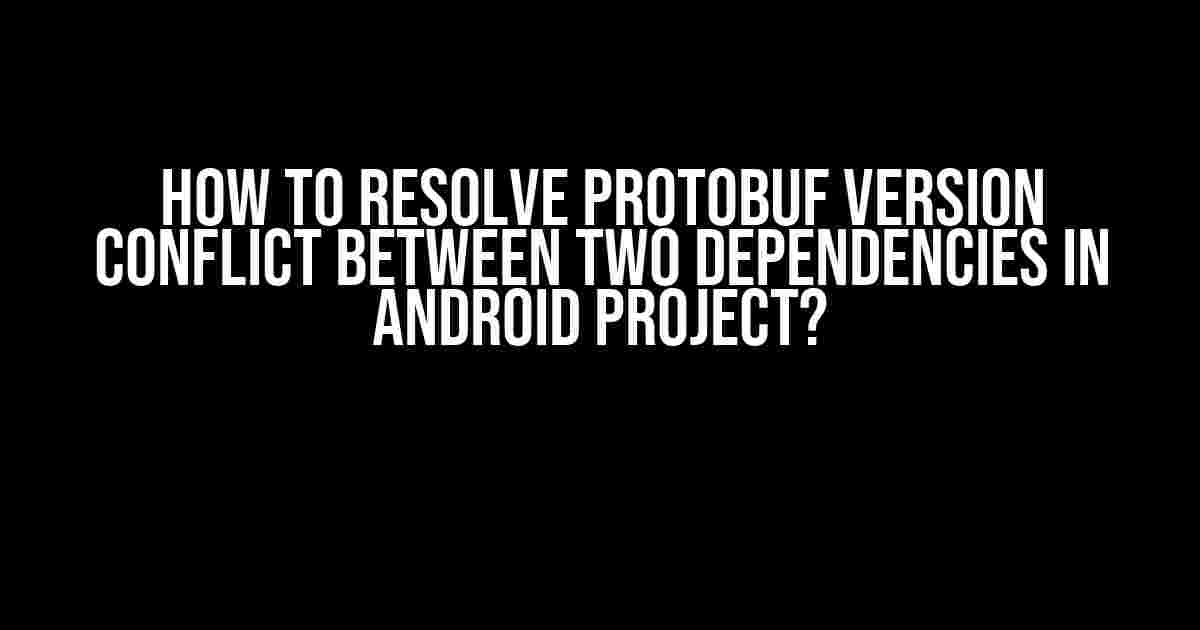Are you tired of dealing with pesky Protobuf version conflicts in your Android project? Do you find yourself stuck in a dependency hell, wondering which version of Protobuf to use? Fear not, dear developer, for we have got you covered! In this article, we’ll guide you through the process of resolving Protobuf version conflicts between two dependencies in your Android project. So, buckle up and let’s dive in!
What is Protobuf, and Why Do Version Conflicts Happen?
Protobuf, short for Protocol Buffers, is a data serialization format developed by Google. It’s widely used in Android development for encoding and decoding data in a compact and efficient manner. However, with great power comes great responsibility – and in this case, version conflicts!
Version conflicts occur when two or more dependencies in your project rely on different versions of Protobuf. This can happen when you’re using libraries or modules that were built with different versions of Protobuf. When you try to compile your project, the Gradle build system gets confused, and you’re left with a nasty error message.
Symptoms of a Protobuf Version Conflict
Here are some common symptoms of a Protobuf version conflict:
- Error messages like “Cannot resolve symbol ‘com.google.protobuf'” or “Duplicate class found in classpath” during compilation
- Gradle build failing with an error message related to Protobuf version incompatibility
- Issues with data serialization and deserialization in your app
- Crashes or unexpected behavior in your app due to incompatible Protobuf versions
Diagnosing the Issue
Before we dive into the solutions, let’s identify the root cause of the problem. To diagnose the issue, follow these steps:
- Check your project’s dependencies: Look for any libraries or modules that rely on Protobuf. You can do this by inspecting your `build.gradle` file or using the Gradle dependency viewer.
- Identify the conflicting versions: Determine which versions of Protobuf are being used by each dependency. You can do this by checking the library’s documentation or looking for version headers in the code.
- Analyze the error messages: Pay attention to the error messages you’re getting during compilation. They might hint at the specific version conflict or incompatibility issue.
Resolving the Conflict
Now that we’ve diagnosed the issue, let’s get to the good stuff – resolving the conflict! Here are a few approaches to resolve the Protobuf version conflict:
Approach 1: Align Dependencies to a Single Version
The simplest solution is to align all dependencies to use the same version of Protobuf. This might require updating some libraries or modules to use a newer or older version of Protobuf.
dependencies {
implementation 'com.google.protobuf:protobuf-java:3.11.0'
implementation 'com.example.library:library:1.0.0'
implementation 'com.example.module:module:2.0.0'
}
In this example, we’re forcing all dependencies to use version 3.11.0 of Protobuf. Make sure to update the versions of your dependencies accordingly.
Approach 2: Use a Shade Plugin
If aligning dependencies isn’t possible, you can use a shade plugin to repackage one of the dependencies with a different version of Protobuf. This approach requires some Gradle magic, but it’s effective:
buildscript {
repositories {
mavenCentral()
}
dependencies {
classpath 'com.githubGenerationStrategy':gradle-shade-plugin:5.0.0'
}
}
apply plugin: Generateion
shade {
def protobufVersion = '3.11.0'
dependencies {
implementation "com.example.library:library:1.0.0"
implementation "com.example.module:module:2.0.0"
}
relocate("com.google.protobuf") {
from(protobufVersion)
to("shaded.protobuf.${protobufVersion}")
}
}
In this example, we’re using the Gradle shade plugin to repackage the `com.example.library` dependency with a custom version of Protobuf. This allows us to use a different version of Protobuf for that specific library.
Approach 3: Use a Custom Protobuf Implementation
If all else fails, you can create a custom implementation of Protobuf that bridges the version gap between your dependencies. This approach requires some coding effort, but it’s a viable solution:
public class CustomProtobuf {
public static class Message {
// Custom implementation of the Protobuf Message class
}
}
In this example, we’re creating a custom implementation of the Protobuf `Message` class that’s compatible with both versions of Protobuf used by our dependencies. This approach requires a deep understanding of the Protobuf internals, so proceed with caution.
Best Practices
To avoid Protobuf version conflicts in the future, follow these best practices:
- Use a consistent version of Protobuf across all dependencies
- Avoid using multiple versions of Protobuf in the same project
- Keep your dependencies up-to-date to ensure compatibility with the latest version of Protobuf
- Use a dependency management tool like Gradle or Maven to manage your project’s dependencies
- Monitor your project’s dependencies regularly to detect potential version conflicts
Conclusion
Resolving Protobuf version conflicts between two dependencies in an Android project can be a painful experience, but with the right approaches and best practices, you can overcome this hurdle. By following the steps outlined in this article, you’ll be well on your way to resolving the conflict and getting your project back on track.
| Approach | Description |
|---|---|
| Align Dependencies | Force all dependencies to use the same version of Protobuf |
| Use a Shade Plugin | Repackage one of the dependencies with a different version of Protobuf |
| Use a Custom Protobuf Implementation | Create a custom implementation of Protobuf that bridges the version gap |
Remember, prevention is the best medicine. By following the best practices outlined in this article, you can avoid Protobuf version conflicts and focus on building amazing Android apps!
Happy coding, and may the odds be ever in your favor!
Frequently Asked Question
Got stuck with protobuf version conflicts in your Android project? Don’t worry, we’ve got you covered! Here are some FAQs to help you resolve the issue:
What causes protobuf version conflicts in an Android project?
Protobuf version conflicts occur when two or more dependencies in your Android project require different versions of the Protocol Buffers (protobuf) library. This can happen when you’ve added dependencies that have been compiled with different protobuf versions.
How do I identify the conflicting protobuf versions in my Android project?
To identify the conflicting protobuf versions, you can use the `dependencies` task in your Android project’s build.gradle file. Run the command `./gradlew dependencies` in your terminal, and it will list all the dependencies and their versions, including the protobuf versions. Analyze the output to find the conflicting versions.
Can I exclude a specific protobuf version from a dependency?
Yes, you can exclude a specific protobuf version from a dependency by using the `exclude` keyword in your build.gradle file. For example, to exclude protobuf version 3.10.0 from a dependency, you can add the following code: `dependencies { implementation(‘com.example:dependency’) { exclude group: ‘com.google.protobuf’, module: ‘protobuf-java’ version ‘3.10.0’ } }`.
How do I force a specific protobuf version in my Android project?
You can force a specific protobuf version in your Android project by adding the following code to your build.gradle file: `dependencies { implementation ‘com.google.protobuf:protobuf-java:x.x.x’ }`. Replace `x.x.x` with the desired protobuf version. This will ensure that all dependencies use the specified protobuf version.
Are there any best practices to avoid protobuf version conflicts in the future?
Yes, to avoid protobuf version conflicts in the future, make sure to use the latest protobuf version that is compatible with all your dependencies. Additionally, always check the dependencies’ documentation for any specific protobuf version requirements. Lastly, keep your project’s dependencies up-to-date and avoid using deprecated versions.




